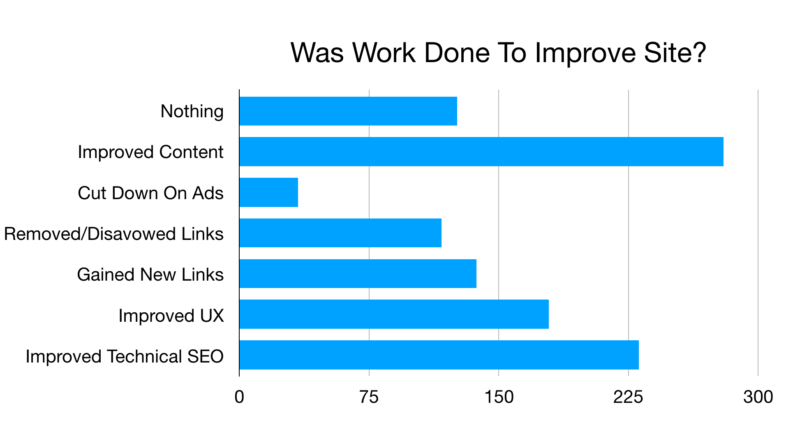SEOs show mixed results following Google March 2019 core update
The data was not conclusive on any specific tactic or type of site impacted by the algorithm change.
We asked you to help us analyze the March 12 core update and after over 500 results we wanted to share that overall the results came out pretty inconclusive. We did not find any significant patterns with this update that stood out as obvious or a clear sign that this update was related to a specific tactic, category of website, or another obvious pattern.
In short, it seems like Google’s overall guidance around these Google core updates correlates to the data in this survey – that there is no specific fix for Google core updates and overall, just try to make your site better in general.
The data. Like we said, we had over 500 results to-date and to be clear, we posted the survey on this site and my personal blog. There is a clear bias there alone by asking SEOs to post their data. Additionally, I emailed over 300 people who took my Medic update survey to take this survey as well, which adds in even more bias and can skew the data.
Not all recovered. One of the more interesting data points was asking if those who were impacted by the March 12 update saw recoveries from previous core updates. About 56 percent of those who responded to that question said yes, they saw a recovery, while 44 percent said no, they did not.
But more saw lower rankings. But when we asked if you were negatively or positively impacted, most said they saw a negative impact from the March 12th Google core update. About 58 percent said they saw a negative impact, 33 percent said they saw a positive impact and 9 percent said they saw no change:
What fixes worked? We also asked what changes did you make to see any recoveries or improvements. Again, the answers were all over the place, from people saying they did nothing and just waited it out, to those who made technical SEO changes, removed links, added links, improved user experience, added better quality content and more. The tactics used, that SEOs felt made a difference, was all over the board:
Again, this shows that these core updates are not targeting a specific type of issue or tactic but a broader range of quality issues.
The categories of sites. The more surprising outcome of the results were the category of sites. Because we asked those who filled out the Medic update survey to fill out this survey, I was expecting more sites in the health and medical space to report issues here. But there was a 10 percentage point drop in the percentage of health-related sites reporting issues compared to the last site. Showing this update was much broader than just the health/medical/wellness space. Here is the breakdown on categories of sites impacted.
Other analysis. We posted data analysis around this Google update last week from some other data providers including Sistrix, Search Metrics, RankRanger and others. Marie Haynes posted stories around recoveries she professionally saw. Glenn Gabe posted his analysis of the update as well. And Google answered some FAQs on this update for us.
What you should do now. If you were impacted, you should probably take a more holistic and unbiased view of your website. Ask others to review your site for ways to improve it. It might need technical SEO changes, it might require better quality content, a site restructure, better user experience or link analysis. Ask colleagues to give you their raw feedback on your site. Pay for an SEO audit or usability audit from a firm. Look for any way to make your site better.
Related stories
New on Search Engine Land

